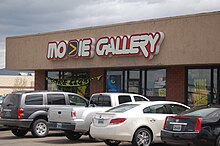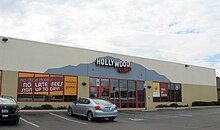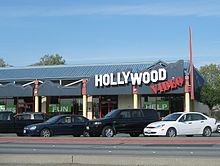Movie Gallery
 | |
 Store closing in Cheyenne, Wyoming as part of the original re-organization from the 2010 bankruptcy | |
| Company type | Public |
|---|---|
| Nasdaq: MOVI | |
| Industry | Retail |
| Founded | 1985 |
| Founders | Joe Malugen Harrison Parrish |
| Defunct | July 31, 2010 (United States) August 8, 2010 (Canada) |
| Fate | Chapter 7 bankruptcy Liquidation sale |
| Headquarters | 1985 Dothan, Alabama
2009 Wilsonville, Oregon |
Areas served | US, Canada |
Key people | Wes Sand (COO) |
| Products | VHS, DVD, Blu-ray and video game rentals and sales |
| Subsidiaries | Hollywood Video MovieBeam Reel.com VHQ |
| Website | MovieGallery.com |

Movie Gallery, Inc. (former NASDAQ ticker symbol MOVI[1]) was the second largest movie and game rental company in the United States and Canada, behind Blockbuster Video. The company rented and sold Blu-ray Discs, DVDs, VHS tapes, and video games. Founded in Dothan, Alabama, the company was headquartered in Dothan, and later in Wilsonville, Oregon.
On April 30, 2010, Movie Gallery announced it was closing and liquidating all of its stores per a filing of Chapter 7 bankruptcy.[2][3] At its peak the firm had about 4,700 stores in North America, operating mainly under the Movie Gallery, Hollywood Video, and GameCrazy brands. The last of the company's stores were closed in August 2010.
In 2011, three Movie Gallery locations in Northwest Arkansas reopened by an independent business owner who acquired the trademark rights in Arkansas. In 2013, an independent businessman in Jackson, Mississippi, acquired the trademark rights in Mississippi to Movie Gallery and Hollywood Video and announced intentions to reopen select previously profitable stores.
Most regular Movie Gallery stores were located in rural areas,[4][5] while Hollywood Video locations, which competed directly with Blockbuster, were located in urban areas.[5]
History
Movie Gallery was formed in 1985 by Joe Malugen and Harrison Parrish in Dothan, Alabama. Through its wholly owned subsidiary, M.G.A., the company's founders began operating video specialty stores in southern Alabama and the Florida panhandle, and franchising the Movie Gallery store concept. By June 1987 the company owned five stores and had a franchise operation of 45 stores. In 1988, the company began to consolidate the franchisees into company owned stores. By 1992, the company had a total of 37 stores and annual revenues of $6 million.
In August 1994, the company completed an initial public offering of its stock. With the proceeds from this offering, the company began to quickly complete acquisitions of various video chains, primarily in the southeast. In early 1995, the company raised additional public funds and continued the acquisition and development of stores. By the middle of 1996, only 22 months after beginning its aggressive expansion strategy, Movie Gallery had grown to over 850 stores through over 100 separate acquisitions.
In 1999, Movie Gallery announced plans to build 100 new stores. The company completed an 88-store acquisition of Blowout Entertainment in May and ended the year with more than 950 locations in 31 states. In 2000, Movie Gallery again set its goal at opening 100 new stores and relocating 25. This goal was surpassed.
The company moved forward with its largest single-chain acquisition to date, expanding its base of stores by 30%, in late December 2001. The addition of Video Update stores to the Movie Gallery family launched the company's international presence with 100 retail locations in Canada. Movie Gallery achieved the 1,678 store mark in 2002.[6]
In 2005, the company completed the largest acquisition to date with the Hollywood Entertainment merger. This combination of companies increased the store total to 4,700 with revenues in excess of $2.5 billion. In addition, Movie Gallery opened 61 new stores in Western Canada with the acquisition of VHQ Entertainment.
Downfall
The company began having financial difficulties and announced the closure of 520 stores in September 2007.[7] At the time Movie Gallery had about 4,500 locations.[7] The next month, the company filed for Chapter 11 bankruptcy protection under the U.S. Bankruptcy Code.[8][9] Because of these troubles, the stock price dropped below $1 (~$1.00 in 2023) per share and was removed from listing on the NASDAQ stock exchange in November 2007.[10]
An additional 400 stores were scheduled to close announced in February 2008, followed by another 160 stores were scheduled to close announced in April 2008 during the bankruptcy reorganization.[11] Movie Gallery emerged from Chapter 11 in May 2008[8] and appointed C. J. Gabriel, Jr. as the new chief executive officer. Founder and former CEO Joe Malugen continued to serve on the Movie Gallery Board of Directors until leaving on July 30, 2008.[12] The company relocated its headquarters to Wilsonville, Oregon (home of the Hollywood Video subsidiary), in late 2008.[13][14][15] In January 2009, they closed their Wilsonville distribution center.[15]
In early 2009, Movie Gallery operated about 2,700 locations and 1,300 Hollywood Video locations in the United States.[16] Canadian operations included over 200 "Movie Gallery" branded stores, as well as approximately 60 under the VHQ brand in western Canada.[citation needed] In 2009 Movie Gallery closed its Wilsonville, Oregon distribution facility, merging it with one in Nashville, Tennessee.[17]
The Chapter 11 reorganization plan failed to solve all of the company's problems; Movie Gallery's stock fell from $1.25 at close in October 2009 to $0.05 a share at close on December 3, 2009,[18] and many locations fell behind on rent.[19] On February 1, 2010, stores received a report stating that about 800 stores were to be shut down. The company hired the law firm of Sonnenschein, Nath & Rosenthal to prepare for a second filing of bankruptcy,[20] and on February 3, 2010, they again filed for Chapter 11 bankruptcy protection.[citation needed] During a company-wide conference call on April 30, 2010, it was announced that all U.S. Hollywood Video, Movie Gallery, and Game Crazy stores would file for Chapter 7 bankruptcy in May 2010.[2] On June 8, 2010, the company's Canadian stores also entered liquidation.[2]
The last US Movie Gallery and Hollywood Video locations closed on July 31, 2010, and the liquidation sale was completed. The remaining Canadian division outlets also closed during the week of August 8. The contents of the company's headquarters were auctioned off in August 2010.[21]
Subsidiaries
MovieBeam
MovieBeam was a set-top service offered in larger cities in which customers could download movies to a set-top box. Most movies expired within 24 hours of downloading. The company was founded by Disney and other investors as an alternative to online movie downloads. A special set-top box had to be purchased by consumers for the service at a retail price of $149.95. Most major movie studios provided new release content to the service. However, MovieBeam failed to gain any serious traction in the marketplace. MovieBeam was shut down on December 15, 2007.[22] As of June 2008 the remnants of MovieBeam, including its trademarks and other intellectual properties, were sold to an outside investors group for approximately $2 million (~$2.78 million in 2023) as part of the company's restructuring. All in-store kiosks for the service were then removed as well.
Hollywood Video

Hollywood Video, a subsidiary of Movie Gallery, Inc., operated from Wilsonville, Oregon, as a DVD and video game rental shop chain in the United States. It was started in 1988 by former CEO Mark Wattles and his wife. The chain was the largest direct competitor of Blockbuster Video until it was purchased by Movie Gallery in 2005. Hollywood Video declared bankruptcy in February 2010 and announced that it would shut down three months later.[23]
Purchase of Hollywood Video
Hollywood Video was the target of a hostile takeover attempt, initially announced at the end of December 2004 by competitor Blockbuster Video. In February 2005, Blockbuster announced an exchange offer of $14.50 (~$22.00 in 2023) per share ($11.50 cash and $3.00 in Blockbuster shares).[citation needed]
In order to create a stronger position against the hostile takeover, Hollywood Video agreed to a buyout on Monday, January 10, 2005, by its smaller competitor Movie Gallery. Movie Gallery paid $860 million, $13.25 per share, and the assumption of $380 million in debt. Stocks closed at $13.85 on January 10 after the news. Blockbuster then dropped its purchase plans, citing anti-trust concerns. Movie Gallery completed its purchase of Hollywood Video on April 27, 2005.[citation needed]
Headquarters
Movie Gallery originally had its headquarters in Dothan, Alabama.[24][25] In Dothan, the company had 70,000 square feet (6,500 m2) of space in the Porter Square Mall.[26] Later in its life the company's headquarters were in Wilsonville, Oregon.[27]
In 2005 Movie Gallery bought Hollywood Video, gaining Hollywood's office space in Oregon.[25] Movie Gallery operated its Oregon office out of the space,[28] and Hollywood Video, now a subsidiary of Movie Gallery, maintained its headquarters in Wilsonville.[29] In 2007 Movie Gallery filed for Chapter 11 bankruptcy protection. In 2008 when the company emerged from Chapter 11, its new upper management had no ties whatsoever to Dothan, Alabama.[26] Joe Malugen, the founder of Movie Gallery, was no longer the CEO; instead, C. J. Gabriel, an Idaho resident, was named the CEO. Because of this, Jim Cook of The Enterprise Ledger said "there may be little motivation for keeping the home office" in Dothan.[25] In 2008 the headquarters moved to Wilsonville. The former Porter Square Mall space went up for lease or sale. Movie Gallery kept some central employees in Dothan, and the company said that it would continue to have a "presence" in Dothan.[26] Wendy Culverwell of the Portland Business Journal said that the headquarters move decision was "unusual" because "most of Hollywood Entertainment's decision-making authority went to Alabama after the sale to Movie Gallery in 2005."[28]
After the company filed for Chapter 7, Great American Group, Inc. held an auction on August 17, 2010, at the Wilsonville, Oregon headquarters of Movie Gallery, auctioning away the company's equipment.[30]
See also
- Veterans Memorial Stadium in Troy, Alabama, formerly Movie Gallery Stadium
References
- ^ Miller, Brian K. "Listed industrial space in area is now plentiful." Portland Business Journal. Friday October 16, 1998. Retrieved September 26, 2010.
- ^ a b c Spector, Mike; Lattman, Peter (May 3, 2010). "Hollywood Video Chain Owner Movie Gallery to Close Remaining U.S. Stores". The Wall Street Journal. Retrieved May 4, 2010.
- ^ "Blockbuster Boost: Movie Gallery Goes Dark". TheStreet.com. May 4, 2010. Archived from the original on June 19, 2010. Retrieved May 4, 2010.
- ^ McMillan, Dan (May 13, 2005). "Hollywood ends run as locally based company". Portland Business Journal. Retrieved September 26, 2010.
- ^ a b Halkias, Maria (May 4, 2010). "Movie Gallery closing stores, which is bittersweet news for Blockbuster". The Dallas Morning News. Retrieved September 25, 2010.
- ^ "Movie Gallery Climbs Forbes' Corporate Ladder". hive4media.com. October 23, 2002. Archived from the original on November 12, 2002. Retrieved September 27, 2019.
- ^ a b "Troubled Movie Gallery is closing 520 stores". Portland Business Journal. September 25, 2007. Retrieved August 22, 2009.
- ^ a b "Movie Gallery Inc. exits bankruptcy". Portland Business Journal on. May 20, 2008. Retrieved August 22, 2009.
- ^ "Movie Gallery files for Chapter 11, outlines plans to reorganize". Portland Business Journal. October 16, 2007. Retrieved August 22, 2009.
- ^ "NASDAQ to remove Movie Gallery on Nov. 19". Portland Business Journal. November 7, 2007. Retrieved August 22, 2009.
- ^ "Movie Gallery closures approach 1,000". Portland Business Journal. February 5, 2008. Retrieved August 22, 2009.
- ^ "Founder Malugen out at Movie Gallery". Portland Business Journal. August 4, 2008. Retrieved August 22, 2009.
- ^ Culverwell, Wendy (August 14, 2009). "Movie Gallery quietly moves to Wilsonville". Portland Business Journal. Retrieved August 22, 2009.
- ^ "Wilsonville gains corporate video titan". Wilsonville Spokesman. August 17, 2009. Archived from the original on March 9, 2009. Retrieved August 22, 2009.
- ^ a b "Movie Gallery shuts Wilsonville facility". Portland Business Journal. January 22, 2009. Retrieved August 22, 2009.
- ^ Company Profile|Reuters.com
- ^ "Movie Gallery shuts Wilsonville facility." Portland Business Journal. January 22, 2009. Modified on January 23, 2009. Retrieved September 26, 2010.
- ^ "List of Public Companies Worldwide – BusinessWeek". Bloomberg BusinessWeek. Retrieved July 9, 2010.[dead link]
- ^ Burritt, Chris; Satariano, Adam (October 29, 2009). "Movie Gallery Late on Rent, May Shut 200 More Stores". Bloomberg L.P. Archived from the original on July 11, 2015. Retrieved July 28, 2014.
- ^ "Movie Gallery Hires Restructuring Lawyers". PE Hub. January 28, 2010.
- ^ Gunderson, Laura (August 13, 2010). "Hollywood Entertainment headquarters in Wilsonville to be liquidated on Tuesday". The Oregonian. Retrieved August 16, 2010.
- ^ Movie Gallery Inc – Home
- ^ Felberbaum, Michael (May 10, 2010). "No. 2 rental chain Hollywood Video to close". NBC News. Archived from the original on November 10, 2013. Retrieved May 10, 2010.
- ^ "Contact Us." Movie Gallery. March 24, 2006. Retrieved September 25, 2010.
- ^ a b c Cook, Jim. "Movie Gallery seeks sequel to early success." The Enterprise Ledger. June 1, 2008. Retrieved September 26, 2010.
- ^ a b c Griffin, Lance. "Movie Gallery says it will keep 'presence' in Dothan Archived 2011-07-28 at archive.today." The Dothan Eagle. December 10, 2008. Retrieved September 26, 2010.
- ^ "Contact Us Archived March 24, 2006, at the Wayback Machine." Movie Gallery. Retrieved September 16, 2009.
- ^ a b Culverwell, Wendy. "Movie Gallery quietly moves to Wilsonville." Portland Business Journal. Friday August 14, 2009. Retrieved September 26, 2010.
- ^ McMillan, Dan. "Hollywood ends run as locally based company." Portland Business Journal. Friday May 13, 2005. 1. Retrieved September 26, 2010.
- ^ Culverwell, Wendy. "Movie Gallery liquidation date set." Portland Business Journal. Friday August 13, 2010. Retrieved September 26, 2010.
External links
 Media related to Movie Gallery at Wikimedia Commons
Media related to Movie Gallery at Wikimedia Commons
